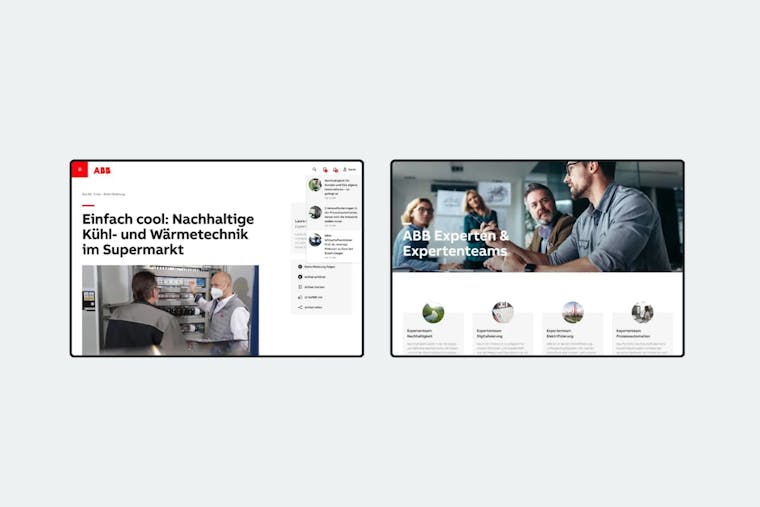20 years of experience
Marketing agency Munich
As a marketing agency from Munich, we master all relevant communication channels in a way that is interdisciplinary and international. We are driven by the speed of the digital transformation as well as the indispensable close collaboration between marketing and sales. We keep a constant eye on the market and your target groups and consistently optimise strategies with the help of data-driven marketing – for your sustainable growth.
Your contact for strategic corporate development

More reach, more efficiency, more turnover: The new role of the marketing agency
Especially in the B2B sector, business and marketing are still seen in technical terms. Thinking is mostly from internal to external. The internal view is of utmost importance and what is developed is usually what the development department thinks is right.
This can be a fatal mistake. In the new millennium, which is shaped by globalisation and digitalisation, the pace of the markets and their participants has increased significantly.
Trends come and go, and those who do not keep a permanent eye on the target group lose out. This is why one of the greatest current challenges is to align all products, processes and also marketing with the market.
Only those who think in a customer-centred way will achieve higher coverage, more leads and more project enquiries – nationally, internationally and worldwide. To this end, strategy, content, creation, media, digital, CRM – in short, the whole marketing spectrum – need to be closely interlinked.
All in all, there is a growing variety of tasks to be handled, ranging from the mundane to the ambitious and highly complex. Is this possible within the company? We at the Ruess Group have been demonstrating for more than 15 years that an external marketing agency is the better choice.
Why an external marketing agency is a better choice
Companies today are faced with major challenges. Advancing digitalisation, globalisation and the associated transformation processes are calling for a rethink in many areas.
Know-how is in demand – and especially specific and professional know-how. It makes sense to outsource business processes partially or even completely in order to benefit from the external expertise of specialised service providers.
The reason is that most of the time this expertise is not available within the companies themselves. Also, medium-sized companies in the B2B sector usually have fewer employees than large companies.
It may feel better to implement all relevant business processes in-house. But the on-site connection and the direct exchange with all departments is usually as cost-intensive as it is ineffective.
In contrast, specialised agencies have a much more targeted infrastructure that enables them to implement tasks or projects more efficiently than is the case if you don’t have employees with the right expertise.
Talking about employees with the right expertise – in view of the shortage of skilled workers and the fact that companies are rarely located in attractive city centre locations, it is also difficult to recruit them for the region or the surrounding area.
It isn’t possible to make a general statement about which areas are better handled in-house or externally, but there are some areas that lend themselves to this in today’s world. One of these is marketing.
In-house is more expensive
An online presence and effective online marketing, especially in the labour-intensive social media, have become indispensable today even for companies that operate primarily in the offline sector.
Many, especially medium-sized companies, are not able to set up their own marketing department simply because of personnel costs and therefore rely on the support of external agencies to cover this important area.
An external marketing agency, after all, has all the necessary specialists to cover all the areas that need to be worked on. And there are many of them: From strategy to content, creation, media, digital and CRM.
If you also consider the effort required for implementation, from texts to film production, photos, organisation of trade fair dates, trade events and much more, you can see that investing in an external marketing agency is more than worthwhile.
Only companies that have a generous marketing budget and can afford to use their marketing department to full capacity only once in a while are in a position to consider an in-house solution.
Not all marketing agencies are created equal
Choosing the right marketing agency shouldn’t depend on gut feeling, but on several hard factors: Industry, target audience, size, goals and budget are just a few.
Industry knowledge is the be-all and end-all. Does the agency understand the market? Does it know what makes its clients tick? Has it already worked with a company of my size? Can they handle small budgets? Or only large ones?
Yes, the best marketing agency is both an expert and an insider in the specific market. It knows the target market as well as the behaviour and values of the target group. And for good reason: because it’s the only way to build a successful marketing strategy.
Marketing as a systematic growth process
Growth needs capital and a lot of capital is in the marketing budgets. This is where a close integration of all fields can generate synergies – from strategy to implementation to media – to open up opportunities for savings.
For this purpose, a good marketing agency has data-driven processes and a connected data warehouse for all possibilities – in order to conduct sound marketing analytics.
And so that communication is targeted and dosed exactly where it is needed and effective. In this context, marketing controllers like those at the Ruess Group usually report 50% growth on certain KPIs.
This translates into more reach, more efficiency and higher turnover. Furthermore, the figures also show that even with an identical budget, the growth potential of many companies is immense.
The systematic growth process in detail
Gut instinct marketing has long outlived its usefulness. It has given way to a stringent systematic approach that makes communication and marketing success measurable and plannable.
01. Define the goals
The foundation for every goal definition is the bundling of all information in a structured briefing or rebriefing. To identify and define the goals on a sound basis.
The reason for this is clear: Only by defining what future state is to be aimed for can effective measures be developed, planned and implemented to achieve these set goals.
These goals represent a compass and guideline for marketing and ensure that all employees, teams, departments, contents and measures are pulling in the same direction and are one hundred per cent effective in reaching the same goals.
However, marketing departments often put the cart before the horse: “We’re going to do Facebook because that’s where we are now. This doesn’t make sense and usually only leads to valuable marketing resources being wasted.
To prevent misunderstandings and inaccuracies, the goals need to be defined as precisely as possible. There are simple criteria for this:
- Be clear, concrete and precise
- Make sure that your goals have KPIs and are measurable
- Be positive and motivating
- Be realistic
- Set deadlines
- Prioritise
- Think in terms of resources
- Avoid conflicting goals
02. Analyse the situation
A detailed situation analysis is another basis for all marketing decisions. For this purpose, all internal and external parameters are analysed that are of importance for the respective decision-making process.
However, determining the current situation is not sufficient, as marketing decisions are directed towards the future. Therefore, a forecast of the most important parameters for the company’s future situation is also necessary.
The achievement of concrete objectives and the development of strategies and measures are virtually impossible without precise knowledge of internal and external factors and their impact.
The factors that are important depend on the company’s specific situation. It should be noted that the underlying data are also subject to constant change. Only those who take these changes into account can successfully adapt their strategy.
Before developing the strategy on marketing, the company’s position should be clear. To identify the current status, the following questions should definitely be asked:
- What are the company’s strengths, what are its weaknesses?
- How attractive is it to the market and its participants?
- Can the market be defined?
- What goals can be achieved?
- How does the target group think and feel?
If you want to be successful with your products or services, you have to know your customers as well as possible. An important marketing task is to gather information about existing and potential customers. This also helps:
- Improve your products or services
- Develop new products or services
- Improve internal processes and customer service
- Discover and develop new customers, target groups and markets
Basically, it is about a company getting to know its customers better in order to meet their requirements, needs or wishes so that they are satisfied, stay in touch and, ideally, recommend you to others.
03: The strategy has to be right
To develop a marketing strategy, companies first need goals – and realistic ones at that. Especially because they have to orient themselves to the inherently limited marketing budgets.
This usually correlates directly with the goals, because it has a direct effect on the selection of marketing measures. After all, large measures such as radio or television spots cannot be carried out with a small budget.
The financial and human resources of a company are usually limited. Therefore, the key question has to be: What can we do with the resources we have? And not: What could we do if we had more resources?
Accordingly, it is important to use the scarce resources wisely. On which subgroups of potential customers should marketing activities be focused because this is where there are the greatest chances of success?
This is why it is so important to know the advantages of your product. And from this, to develop exactly the advertising messages that will generate interest in the product or service among the target customers.
Marketing messages can be very different, depending on the company or industry. Because the needs of the customers are also different, even if they buy the same product.
Some people are primarily concerned with the price, others with the product’s features. This is the case with virtually all products – regardless of whether they are consumer goods or complex investment goods.
Once the marketing messages have been formulated, they have to reach the target group. By using the right marketing instruments. And here, the choice of communication channels is decisive:
Perhaps press work is the right tool, or attending trade conferences and trade fairs – or advertisements, mailings or telephone marketing? Not to forget: Trade articles or presentations at trade fairs – specifically in the area of classic communications.
But today, people think and work digitally: On the website, a blog, in social media such as Facebook, Instagram, LinkedIn, etc. High-quality web design, content, clips, ads, posts and articles are needed. And you need an experienced marketing agency that can skilfully play on the channels. Not just one, but each with the right dose to enable targeted growth through communication.
04: Monitor your activities
First and foremost, how the specific measures change the key figures. This is done by measuring their impact on sales, customer satisfaction, brand value, image or employee loyalty.
As well as the contribution of marketing to the company’s success. How does it change the company figures, turnover, profit and company value? Or in short: how much more business does it generate?
But before more business can be generated, the key figures for the specific measures have to be determined. In the case of a mailing, for example, these are the response, turnover per response, costs per response and the number of new customers.
Overarching marketing key figures
- Amount of additional products sold per year
- New customers in the last 12 months
- Project enquiries in the current business year
- Image and awareness
- Customer satisfaction
- Customer loyalty
- Customer complaints
- Market share in general
In this respect, marketing controlling serves to ensure and establish the success of marketing measures. This is why it isn’t a task for just anyone, but rather for an experienced marketing agency.
In conclusion: Marketing is so much more than just communication
In the past, basic knowledge of the market and the target group was enough for a marketing agency to be successful. After all, it only came down to a few professional articles or advertisements. The number of communication channels was limited and the target groups easy to reach.
Markets were relatively simple, the customers grateful and willing to adapt the purchased product to their demands and needs themselves. Those days are long gone! Markets and customers are fragmented, the world is globalised and competitors are lurking around every corner.
In this respect, corporate management and the communication of corporate services have to orientate themselves to the market. Innovations are no longer thought out from within the company, but directly from the customer.
Knowing, understanding and putting yourself in the customer’s shoes is the new king of marketing. Using the necessary tools, market research, etc. is the daily business for marketers and their marketing agencies.
And, of course, keeping an eye on costs – in an area that is teeming with communication channels. The challenge is to keep an overview and to combine the measures in such a way that synergies can be exploited.
So what’s the bottom line? We at the Ruess Group know that 50 to 100 percent more reach can be achieved from identical budgets by closely dovetailing planning and implementation – as well as 20 percent more leads and project enquiries.
A long list of well-known clients, mainly in the B2B sector, shows that this is far from being an empty promise. National and international, aspiring and existing world market leaders – and in relatively technical sectors that require explanation.
What are your challenging goals and assignments? I would be happy to discuss them with you.




